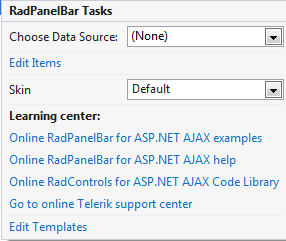Smart Tag
The RadPanelBar Smart Tag allows easy access to frequently needed tasks. You can display the Smart Tag by right clicking on a RadPanelBar control in the design window, and choosing Show Smart Tag.
Unbound Smart Tag
When RadPanelBar is unbound, the Smart Tag looks like the following:

Using the unbound RadPanelBar Smart Tag you can perform the following:
RadPanelBar Tasks
Choose Data Source lets you bind the menu declaratively by selecting a data source from a drop-down list of all available data source components. If you select
<New Data Source...>the standard Windows Data Source Configuration Wizard appears, where you can create and configure a data source component.Build RadPanelBar... opens the RadPanelBar Item Builder, where you can create and configure statically-defined items for your menu.
Ajax Resources
Add RadAjaxManager... adds a RadAjaxManager component to your Web page, and displays the r.a.d.ajax Property Builder where you can configure it.
Replace ScriptManager with RadScriptManager replaces the default ScriptManager component that is added for AJAX-enabled Web sites with RadScriptManager.
Add RadStyleSheetManager adds a RadStyleSheetManager to your Web page.
Skin
The Skin drop-down lets you preview the built-in skins and select one for your menu.
Learning Center
Links navigate you directly to RadPanelBar examples, help, or code library. You can also search the Telerik web site for a given string.
Edit Templates
Clicking the Edit Templates link brings up a template design surface where you can create or edit the templates your RadPanelBar uses.
Bound Smart Tag
When RadPanelBar is bound to a data source, the Smart Tag looks like the following:
Using the bound RadPanelBar Smart Tag you can perform the following:
RadPanelBar Tasks
Choose Data Source lets you change the declarative menu binding by selecting a data source from a drop-down list of all available data source components. If you select
<New Data Source...>the standard Windows Data Source Configuration Wizard appears, where you can create and configure a data source component. If you select "(None)", you remove the existing binding.Configure Data Source... opens the standard Windows Data Source Configuration Wizard, where you can configure the currently bound data source component.
Refresh Schema refreshes the schema for the currently bound data source component.
Edit RadPanelBar Databindings... opens the NavigationItemBinding Collection Editor, where you can specify databindings to map between the fields in the data source and RadPanelItem properties.
Once the Data Source is chosen, you can select each one of the following: DataFieldID, DataFieldParentID, DataTextField, DataValueField and DataNavigationUrlField. For the first two, you need to select the fields in the Data Source that will be used when creating the hierarchy of RadPanelBar Items. The rest will serve data respectively for the Text, Value and NavigateUrl properties of RadPanelBar Items.
Edit Templates brings up the template design surface, where you can create or edit the templates your RadPanelBar uses.